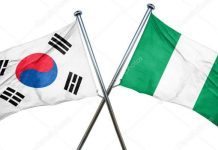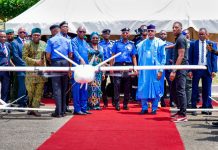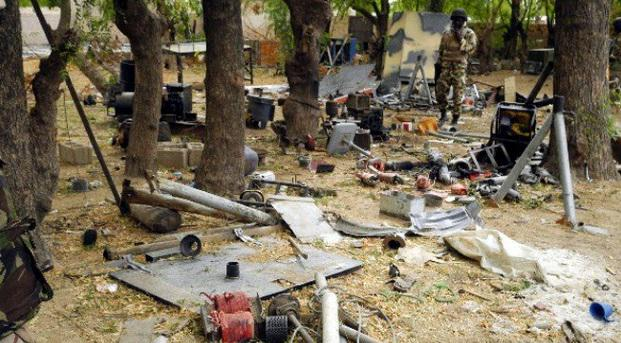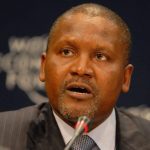By Idowu Ajibade
When Governor of Benue state, Samuel Ortom recently announced the receipt of N12.7billion refund from the Paris and London Clubs, he did so with some sense of relief. It is understandable. Benue, like most states of the federation, is insolvent -unable to honour its financial obligations to its employees. Like other governors, Mr. Ortom’s only hope of ensuring a blue Christmas for his staffers was perhaps the second bailout which governors were seeking from President Muhammadu Buhari. So, when the refund from the over-deduction by foreign creditors, namely: London Club, Paris Club and other multilateral organizations was paid, it came rather handy but not without controversy.
However, the Benue governor was quick to clear the air that what accrued to the state was N12.7 billion and not N90 billion as speculated in media reports. The amount represents 25 percent of the $181 million which is the total amount owed the state from the creditors’ refund.
According to him, the 23 Local government councils in Benue would take 45 percent of the money while that state would utilize the remaining 50 percent. Mr. Ortom went ahead to state that President Muhammadu Buhari’s directive to use half of the amount to offset salary arrears of civil servants at the state and local government level. Obviously, Benue is one of the insolvent states struggling to meet its financial commitment to its workers. It is therefore not surprising that the spending priorities are already being determined. But then, that is exactly appropriate. A clear understanding of the history of the refund would not only vitiate the directive of President Buhari on the fund but raise further question on the issue of local government autonomy.
Until the appointment of the London-based International lawyer, Ned Munir Nwoko as solicitor by the governments of Adamawa and Taraba, the two states that emerged from the old Gongola state in March 2005, the matter of debt overhang on Nigeria had become burdensome. A huge percentage of the nation’s budget was dedicated to debt servicing. The newly created Debt Management Office, seemed helpless in the face of unjust deductions arising from illegal charges. The creditors exploited the lack of proper booking by the debtors to impose illegal charges. This being so, the figure was what the creditors says it was.
However, the situation assumed a new twist following a visit to Abuja by the then World Bank Chief, Joseph Wolfgang. Mr. Wolfgang claimed during his official visit that Nigeria’s foreign debt was $35billion. One week later, the then Vice President Atiku Abubakar had to refute the claim, insisting that what Nigeria was owing was $25billion.
The Gongola’s case then offered the most strategic lieu way to not only determine the amount owed but also to secure refund where it is proven that debts have been overpaid.
That was the beginning of the intervention of the Nwoko Solicitors, a London-based legal firm, appointed by Adamawa government in respect of her debt profile. Mr. Nwoko, a former member of the 4th National Assembly and Principal partner in the firm had written to the then finance minister Ngozi Okonjo-Iweala expressing shock over the conflicting figures bandied by Mr. Wolfgang and Mr. Atiku. Later he approached the then President Olusegun Obasanjo, assuring him of his expertise and how he could reduce the nation’s foreign debt nothing. Having done his preliminary work on it, he told Obasanjo assuredly that all loans have been paid up since 1993 and that he needed an opportunity to prove that. What Obasanjo did with his intervention was to stop further deduction once the position of the solicitor was found to be correct.
Starting with the old Gongola, he got the brief to carry out the work. The scope of the assignment includes: Liaising with all creditors and obtain all relevant information in relation to their claim, liaise with the federal ministry of finance and debt management office and obtain all relevant documentation in relation to all loans, guarantees, deductions, and remittances and up to date statement of loan Account of the state, and critically analyse the state of the foreign debt Accounts of the state and ascertain: the total amount of money borrowed by the state since 1976, the total amount paid by the state, total outstanding balance if any, legality of any interest, commission or penalties charged on the loans granted, identify the lending institutions and the legality of any loan agreement executed with them.
Others are, the liabilities and obligations of the state government under the various loan agreement, initiate and/or institute civil proceedings in any relevant court against any person or institution with a view to seeking redress in respect of any matter relating to the foreign debt owed by the state among others. The effort paid off. It proved to be what was needed to unravel the mystery of Nigeria’s external debt portfolio. The company contested all the loans and deductions, compelling the British government, that had earlier declined cooperation, to throw light on the indebtedness.
No sooner the solicitors swung into action than it came up damning reports. “The defunct Gongola state did not negotiate nor drawn down from any of these financial institutions.” What happened was that some persons/firm did on its behalf in a manner that was bizarre to all known accounting principle. The findings contained in the “brief on the Guaranteed External Loans of Defunct Gongola state (now Adamawa and Taraba states),” further observed that “there is evidence that all the guaranteed loans from the Paris and London clubs had been fully repaid by 1st December, 1992…”
The efforts further yielded earth-shaking revelations of massive sleaze and indeed lack of accountability that characterized the military regime under which most of the loans were obtained. There were instances where loans were taken and spent on phantom projects on behalf of the state government by firms or organizations without recourse to the government. As the London Solicitors dug in, the matter soon became a subject of disputation between the Debt Management Office (DMO) and Adamawa with Taraba, owing to some questionable deductions found to have been made from the coffers of the two states. In one instance, a bank in Austria, Bank Austria Creditanstalt in a reply to enquiry about the status of indebtedness of Adamawa as purported, denied given any loan to the state. In the letter dated 18.07.2005 with reference no.: LN/Adamawa/Taraba/200511253, the bank said there was no record of any loan to the state for construction of Hotel. It stated that after thorough search of its records it has found no reference to the financing mentioned. “it is very unlikely that the projects were financed in Nigeria,” it added. Yet, deductions have been made to offset such phantom loans. Investigations show that banks like the Royal Bank of Scotland was purportedly owed $5,000 000 and London Branch of Deutsch Bank was owed $10, 000 000. APROFIM and Standard Chartered also have different sums in loans advanced to the states.
On Thursday, 9th June, 2005, a Committee comprising representatives of the Federal Ministry of Finance, office of the Accountant General of the Federation (AGF), Debt Management Office (DMO), Central Bank of Nigeria (CBN), Revenue Mobilisation, Allocation and Fiscal Commission, Adamawa and Taraba States, was set up to reconcile and authenticate the submissions of Adamawa and Taraba States that they have completed their repayments of Paris/London Club loans obtained in 1983. This writer witnessed the meeting as an observer.
The Technical Sub-committee noted that unsecured loans totaling $104.6million, were obtained in respect of four projects namely: Yola International Hotel -$32.4million, Jama’are River Basin Development Authority -$12.5million, Hospital Equipment -$4.8million and Yola International Hotel $54.9million. The amounts as stated were deducted from the Account of Adamawa and Taraba States (Defunct Gongola State) as stated in their report of April 2005. According to the Committee report, this also appeared in the various Ledgers and Records of the Federal Ministry of Finance and the Accountant General Office.
In its findings, the committee stated that “the CBN should make available names of the various creditors who claimed this amount between 1983 – 1986. The sub-committee is also willing to verify these facts on submission of details by the Central Bank of Nigeria, since the claims of Adamawa and Taraba States have not been disputed by any of the responsible offices,” the sub-committee added in its report. The company was also employed to look at the deductions made blindly from the three-tiers of government. It soon found out the Local Council did not take any loan. And a $3.1billion dollar award judgement was obtained, vindicating the finding of the solicitors and position that the L.G did not take any loan.
The Court in London consequently ruled in favour of a refund for over-deduction which hitherto had gone unchallenged. Interestingly, the intervention by the London Solicitors did not go down well with the foreign creditors as some of them raised strong objections to the fact that their secret deeds are now being exposed. The situation had been that the creditors determined what the bills were and lord it over the nation, and since many of the deals were not transparent abinitio, Nigeria became a victim, suffocation under a debt burden that it can hardly be said to have offered any meaningful benefit.
Suffice to say that the recent refund to the 774 local government councils was a proceed of deductions made directly from the Councils Account to service debts that were never borrowed by them. It
In January 2016, a federal high court sitting in Abuja ordered a refund of $3.1billion to the coffers of the 774 Local Government Area Councils in Nigeria. The court directed the Central Bank of Nigeria (CBN) to pay the sum of $3.2billion wrongfully deducted from the accounts of the 774 Local Government Councils in the country. Specifically, the court ordered the immediate payment of “$3.1billion or its Naira equivalent” back to the Local Councils’ coffer.
The court told the CBN after listening to the arguments of both sides, to go ahead to enforce the earlier judgement which directed a refund to the council. Lead Counsel to the Council, Joe Okey Agi (SAN) had prayed the court to garnishee the sum of $3.1billion in the hand of CBN and be paid to the Councils. Counsel to CBN, Ahmed Raji (SAN) had earlier told the court that the apex bank is in custody of over $26billion belonging to the Federal Government. The order was an enforcement of earlier judgement of December 10, 2013 in which the court faulted the deduction from Councils account by the federal government to service loans owed to the London Club and Paris Club. The plaintiffs had also secured a federal government fiat to execute the judgement since similar refunds were made to some states.
It would be recalled that judgment was given in favour of the Councils in the suit (No FHC/ABJ/129/2013), filed on 11 June 2013, at the Federal High Court, Abuja. In the class action suit, Aba North Local Government, among other local councils (applicants) and Linas International Limited (creditor) had sued the Attorney-General of the Federation, Ministry of Finance and Accountant-General of the Federation over the illegal deductions, totaling $3.2billion, made by the Federal Government from the statutory allocations due to the councils in respect of the 1992 London Club Debt buy-back and the 2006 London Club Debit exit championed by Mrs. Okonjo-Iweala.
The plaintiffs had challenged a decision taken by the Federal Government in 1992 whereas the action was based on the 1999 Constitution, which did not become operational until seven years after the decision. The suit also challenged the fact that the decision of the Federal Government was taken 21 years earlier. Such were the efforts that led to the refunds that are now been shared by governors. The sharing has attracted mixed reactions from across the states. Some have accused the governors of misapplication of the fund while others alleged misappropriation. As it stands, it could be said that beyond the sharing of the refund largesse, the last is yet to be heard of the matter.














